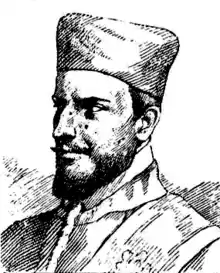1602 in music

Francesco Cavalli (born Pietro Francesco Caletti-Bruni 14 February 1602 – 14 January 1676) was an Italian composer of the early Baroque period. He took the name "Cavalli" from his patron, Venetian nobleman Federico Cavalli.
| |||
|---|---|---|---|
|
Events
- Asprilio Pacelli is appointed maestro di capella of St Peter's Basilica
Publications
- February – Giulio Caccini – Le nuove musiche [1] (The New Music), published in Florence
- Agostino Agazzari – Sacrae cantiones, book 1 (Rome: Aloysio Zannetti)
- Gregor Aichinger – Divinae laudes ex floridis Jacobi Pontani potissimum decerptae (Augsburg: Officina Praetoriana), settings of selections from the Floridorum of Jacobus Pontanus, for three voices
- Felice Anerio
- Giammateo Asola
- Psalmi ad vespertinas omnium solemnitatum horas (Vespertine psalms for all solemnities) for three voices (Venice: Ricciardo Amadino), also includes a Magnificat, Salve Regina, and Regina caeli
- Hymnodia vespertina in maioribus anni solemnitatibus... (Vespertine hymns for the major solemnities of the year) for eight voices (two choirs) (Venice: Ricciardo Amadino)
- Lamentations for six voices (Venice: Ricciardo Amadino)
- Ippolito Baccusi – Psalmi qui diebus festivus a Sancta Romana Ecclesia in vesperis decantari solent for five voices (Venice: Ricciardo Amadino)
- Giovanni Bassano – First book of madrigals and canzonettas for soprano or bass voice with lute or other plucked instrument (Venice: Giacomo Vincenti)
- Lodovico Bellanda – First book of madrigals for five voices (Venice: Ricciardo Amadino)
- Aurelio Bonelli – First book of ricercars and canzonas for four voices (Venice: Angelo Gardano)
- Christoph Demantius – Trias precum vespertinarum for four, five, and six voices and instruments (Nuremberg: Catharina Dieterich for Konrad Agricola), a collection of music for Vespers
- Scipione Dentice – Fourth book of madrigals for five voices (Naples: Antonio Pace)
- Stefano Felis – Ninth book of madrigals for five voices (Venice: Giacomo Vincenti)
- Melchior Franck
- Musicalischer Bergkreyen for four voices (Nuremberg: Konrad Baur), a collection of secular partsongs
- Farrago for six voices (Nuremberg: Katharina Dieterich), a collection of secular partsongs
- Contrapuncti composti for four voices (Nurember: Konrad Baur), a collection of psalms and other church songs in German
- Marco da Gagliano – First book of madrigals for five voices (Venice: Angelo Gardano)
- Bartholomäus Gesius – Ein Gesang Vom Lob und Preiß der Edlenfreyen Kunst Musica for six voices (Frankfurt an der Oder: Friedrich Hartmann), a song in praise of Music
- Pierre Guédron – Airs de cours for four and five voices (Paris: Ballard)
- Claude Le Jeune – First book of psalms for three voices (Paris: widow of R. Ballard)
- Alonso Lobo – First book of masses (Madrid: Joannes Flandre)
- Duarte Lobo – Opuscula Natalitiae noctis responsoria for four and eight voices (Antwerp: Plantin), a collection of liturgical music
- Tomaso Pecci – Madrigals for five voices (Venice: Angelo Gardano), also contains two pieces by Mariano Tantucci
- Andreas Pevernage – Masses for five, six, and seven voices (Antwerp: Pierre Phalèse), published posthumously
- Costanzo Porta – Hymnodia sacra for four voices (Venice: Angelo Gardano), a collection of hymns for the whole year
- Hieronymus Praetorius – Magnificats for eight voices (Hamburg: Philip von Ohr)
- Orfeo Vecchi
- Third book of masses for five voices (Milan: Agostino Tradate)
- La Donna vestita di sole, coronata di stelle, calcante la luna (Milan: the heirs of Simon Tini & Giovanni Francesco Besozzi), a madrigal cycle
- Lodovico Grossi da Viadana – Cento concerti ecclesiastici (One Hundred Church Concertos), the first major publication to make extensive use of figured bass
Opera
- Giulio Caccini – Euridice (not the same as the 1600 opera of the same name by Jacopo Peri, to which Caccini contributed some of the music)
Births
- February 14 – Francesco Cavalli, Italian composer (died 1676)
- April – William Lawes, English composer (died 1645)
- probable – Chiara Margarita Cozzolani, Italian composer (died 1678)
Deaths
- January 6 – Andreas Raselius, German composer (born c. 1563)
- March 11 – Emilio de' Cavalieri, Italian composer (born c. 1563)
- October – Thomas Morley, English composer, music theorist and publisher (born c. 1557)
- November 29 – Anthony Holborne, English composer (born c. 1545)
Notes
- Le nuove musiche was published in 1602 per the Gregorian calendar. Some sources list 1601, based on the Julian calendar, as the publication date.
This article is issued from Wikipedia. The text is licensed under Creative Commons - Attribution - Sharealike. Additional terms may apply for the media files.